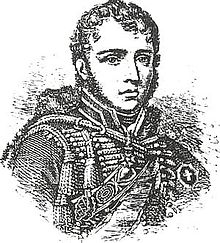François Antoine Lallemand
François Antoine Lallemand , called Charles Lallemand (born June 23, 1774 in Metz , † March 9, 1839 in Paris ) was a French Général de division .
Life
At the age of 18, Lallemand entered the army in 1792 and joined the cavalry . During the revolution he served mostly in France and Spain , but also had assignments in Egypt and Hispaniola . In 1804 he married the Creole Caroline Lartigue in New York .
After the Battle of Borodino he was assigned to Marshal Louis-Nicolas Davout's staff and came to Hamburg with him . Napoleon was defeated and Lallemand now joined the army of King Louis XVIII. on. As a supporter of Napoleon, Lallemand, like his brother Henri, was not a friend of the Bourbons and in 1815 they were suspected of revolutionary activities and arrested.
When Napoleon left Elba and the reign of the Hundred Days began, they were dismissed and immediately accepted into the Garde impériale . After the Battle of Waterloo (June 18, 1815) Lallemand accompanied Emperor Napoleon to Rochefort , where he surrendered. Lallemand wanted to accompany Napoleon into exile, but the British limited Napoleon's staff and forbade it. Lallemand was brought to Malta with some other officers and imprisoned there in one of the fortresses .
After two months, Lallemand and some other officers managed to escape from the island with the help of smugglers. They were sentenced to death in absentia in a show trial . Unlike other convicts, Lallemand, like his brother Henri, was exempt from an amnesty .
Under the code name "General Cotting" Lallemand came to Boston on the ship Triton via Liverpool . With the support of a network of French veterans and refugees, he later came to Philadelphia , where he even became president of the French Emigrant Association (FEA). As such, he made every possible effort to free Napoleon and / or install his brother Joseph on the throne of a South American country.
In order to raise funds and get a larger base, the FEA planned to build a kind of crown colony in Texas ; Champ d'Asile . On December 17, 1817, a group of 150 settlers set out for Galveston . On February 2, Lallemand and his brother came to New Orleans and by March 10 had recruited an additional 120 settlers. They sailed the Triton River towards Atascosito and built two forts there for their defense.
The Mexican government under Antonio María Martínez saw this as a direct threat and gathered a force nearby in order to be able to strike immediately. When Lallemand and the settlers heard about this army, they abandoned Champ d'Asile around July 24th and fled back to Galveston. Through the acquaintance of the buccaneers Jean Laffite and Amable Humbert , Lallemand and some loyal followers quickly escaped to New Orleans.
Lallemand became a US citizen and Napoleon bequeathed him 100,000 francs in his will to pay the debts that he had incurred for his liberation.
In 1823 Lallemand secretly returned to Europe and settled in Lisbon ; the British still sentenced to death. When, after the July Revolution of 1830, King Louis-Philippe I recognized the former imperial military ranks, Lallemand returned to France and settled in Paris.
He was rehabilitated and in the same year the king gave him the honorary title lieutenant-général and raised him to peer of France .
In 1837 he was appointed head of the military administration in Corsica because of his services . He gave up this post the following year and returned to Paris. He died at the age of almost 65 on March 9, 1839, and found his final resting place there.
Honors
- June 14, 1804 Chevalier of the Legion of Honor
- July 11, 1807 Officer of the Legion of Honor
- August 23, 1814 Grand Cross of the Legion of Honor
- 1811 Baron de l'émpire
- Grand Cross of the Order of Dannebrog (awarded by the Danish King Friedrich VI. )
- His name can be found on the west pillar (37th column) of the triumphal arch on Place Charles-de-Gaulle (Paris).
literature
- David Chandler: The campaigns of Napoleon . Weidenfeld, London 1993, ISBN 0-297-81367-6 (reprint of the London 1966 edition).
- Kevin F. Kiley: Once there were titans. Napoleon'S generals and their battles, 1800-1815 . Greenhill, London 2007, ISBN 978-1-85367-710-6 .
- Charles Mullié: Biography of the célébrités militaires des armées de terre et de mer de 1789 à 1850 . Poignavant, Paris 1852 (2 vols.).
- Digby Smith : The Napoleonic Wars data book . Greenhill Books, London 1998, ISBN 1-85367-276-9 .
Individual evidence
- ↑ s. a .: French period .
| personal data | |
|---|---|
| SURNAME | Lallemand, François Antoine |
| ALTERNATIVE NAMES | Lallemand, Charles |
| BRIEF DESCRIPTION | French lieutenant general |
| DATE OF BIRTH | June 23, 1774 |
| PLACE OF BIRTH | Metz |
| DATE OF DEATH | March 9, 1839 |
| Place of death | Paris |
